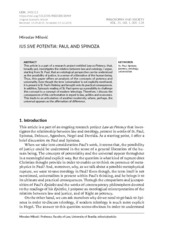Ius sive Potentia: Paul and Spinoza
Ius sive Potentia: Pavle i Spinoza
Чланак у часопису (Објављена верзија)
Метаподаци
Приказ свих података о документуАпстракт
This article is a part of a research project entitled Law as Potency, that, broadly put, investigates the relation between law and ontology. I argue, starting from St. Paul, that an ontological perspective can be understood as the possibility of justice, in a sense of a liberation of the human being. Thus, this paper offers an analysis of the concepts of potency and universality. Even though the term ‘universalism’ is not explicitly mentioned, it is present in St. Paul’s thinking and brought onto its practical consequences. In addition, Spinoza’s reading of St. Paul opens up a possibility to challenge this concept to a concept of modern teleology. Therefore, I discuss the consequences of this confrontation in regard to law, politics and economics. This leads to an articulation of another modernity, where, perhaps, the universal appears as the affirmation of difference.
Ovaj članak je deo istraživačkog projekta pod nazivom Zakon kao potencija, koji, u širem smislu, istražuje odnos prava i ontologije. Tvrdim, polazeći od Sv. Pavla, da se ontološka perspektiva može shvatiti kao mogućnost pravde, u smislu oslobađanja ljudskog bića. Stoga ovaj rad nudi analizu koncepata potencije i univerzalnosti. Iako termin „univerzalizam“ nije izričito pomenut, on je prisutan u mišljenju Sv. Pavla i doveden do svojih praktičnih posledica. Pored toga, Spinozino čitanje Sv. Pavla otvara mogućnost da se ovaj koncept iskuša konceptom moderne teleologije. Stoga raspravljam o posledicama ovog sučeljavanja u pogledu zakona, politike i ekonomije. To dovodi do artikulacije druge modernosti, gde se, možda, univerzalno pojavljuje kao afirmacija razlike.
Кључне речи:
St. Paul / Spinoza / potency / ontology / universalismИзвор:
Filozofija i društvo/Philosophy and Society, 2020, 31, 1, 84-97Издавач:
- Beograd : Institut za filozofiju i društvenu teoriju
URI
http://journal.instifdt.bg.ac.rs/index.php?journal=fid&page=article&op=view&path%5B%5D=https%3A%2F%2Fdoi.org%2F10.2298%2FFID2001084Mhttp://rifdt.instifdt.bg.ac.rs/123456789/2069
Институција/група
IFDTTY - JOUR AU - Milović, Miroslav PY - 2020 UR - http://journal.instifdt.bg.ac.rs/index.php?journal=fid&page=article&op=view&path%5B%5D=https%3A%2F%2Fdoi.org%2F10.2298%2FFID2001084M UR - http://rifdt.instifdt.bg.ac.rs/123456789/2069 AB - This article is a part of a research project entitled Law as Potency, that, broadly put, investigates the relation between law and ontology. I argue, starting from St. Paul, that an ontological perspective can be understood as the possibility of justice, in a sense of a liberation of the human being. Thus, this paper offers an analysis of the concepts of potency and universality. Even though the term ‘universalism’ is not explicitly mentioned, it is present in St. Paul’s thinking and brought onto its practical consequences. In addition, Spinoza’s reading of St. Paul opens up a possibility to challenge this concept to a concept of modern teleology. Therefore, I discuss the consequences of this confrontation in regard to law, politics and economics. This leads to an articulation of another modernity, where, perhaps, the universal appears as the affirmation of difference. AB - Ovaj članak je deo istraživačkog projekta pod nazivom Zakon kao potencija, koji, u širem smislu, istražuje odnos prava i ontologije. Tvrdim, polazeći od Sv. Pavla, da se ontološka perspektiva može shvatiti kao mogućnost pravde, u smislu oslobađanja ljudskog bića. Stoga ovaj rad nudi analizu koncepata potencije i univerzalnosti. Iako termin „univerzalizam“ nije izričito pomenut, on je prisutan u mišljenju Sv. Pavla i doveden do svojih praktičnih posledica. Pored toga, Spinozino čitanje Sv. Pavla otvara mogućnost da se ovaj koncept iskuša konceptom moderne teleologije. Stoga raspravljam o posledicama ovog sučeljavanja u pogledu zakona, politike i ekonomije. To dovodi do artikulacije druge modernosti, gde se, možda, univerzalno pojavljuje kao afirmacija razlike. PB - Beograd : Institut za filozofiju i društvenu teoriju T2 - Filozofija i društvo/Philosophy and Society T1 - Ius sive Potentia: Paul and Spinoza T1 - Ius sive Potentia: Pavle i Spinoza IS - 1 VL - 31 SP - 84 EP - 97 DO - 10.2298/FID2001084M ER -
@article{
author = "Milović, Miroslav",
year = "2020",
abstract = "This article is a part of a research project entitled Law as Potency, that, broadly put, investigates the relation between law and ontology. I argue, starting from St. Paul, that an ontological perspective can be understood as the possibility of justice, in a sense of a liberation of the human being. Thus, this paper offers an analysis of the concepts of potency and universality. Even though the term ‘universalism’ is not explicitly mentioned, it is present in St. Paul’s thinking and brought onto its practical consequences. In addition, Spinoza’s reading of St. Paul opens up a possibility to challenge this concept to a concept of modern teleology. Therefore, I discuss the consequences of this confrontation in regard to law, politics and economics. This leads to an articulation of another modernity, where, perhaps, the universal appears as the affirmation of difference., Ovaj članak je deo istraživačkog projekta pod nazivom Zakon kao potencija, koji, u širem smislu, istražuje odnos prava i ontologije. Tvrdim, polazeći od Sv. Pavla, da se ontološka perspektiva može shvatiti kao mogućnost pravde, u smislu oslobađanja ljudskog bića. Stoga ovaj rad nudi analizu koncepata potencije i univerzalnosti. Iako termin „univerzalizam“ nije izričito pomenut, on je prisutan u mišljenju Sv. Pavla i doveden do svojih praktičnih posledica. Pored toga, Spinozino čitanje Sv. Pavla otvara mogućnost da se ovaj koncept iskuša konceptom moderne teleologije. Stoga raspravljam o posledicama ovog sučeljavanja u pogledu zakona, politike i ekonomije. To dovodi do artikulacije druge modernosti, gde se, možda, univerzalno pojavljuje kao afirmacija razlike.",
publisher = "Beograd : Institut za filozofiju i društvenu teoriju",
journal = "Filozofija i društvo/Philosophy and Society",
title = "Ius sive Potentia: Paul and Spinoza, Ius sive Potentia: Pavle i Spinoza",
number = "1",
volume = "31",
pages = "84-97",
doi = "10.2298/FID2001084M"
}
Milović, M.. (2020). Ius sive Potentia: Paul and Spinoza. in Filozofija i društvo/Philosophy and Society Beograd : Institut za filozofiju i društvenu teoriju., 31(1), 84-97. https://doi.org/10.2298/FID2001084M
Milović M. Ius sive Potentia: Paul and Spinoza. in Filozofija i društvo/Philosophy and Society. 2020;31(1):84-97. doi:10.2298/FID2001084M .
Milović, Miroslav, "Ius sive Potentia: Paul and Spinoza" in Filozofija i društvo/Philosophy and Society, 31, no. 1 (2020):84-97, https://doi.org/10.2298/FID2001084M . .


